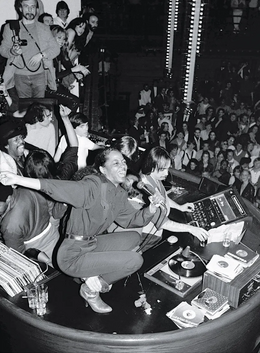Disco Revolt: Difference between revisions
No edit summary |
No edit summary |
||
| Line 24: | Line 24: | ||
==City by city== | ==City by city== | ||
===Puerto Bontia=== | |||
===Ciudad Alaha=== | |||
===Ciudad Fernando=== | |||
===Nuevo Toqui=== | |||
===Culerbra=== | |||
==Political movement== | ==Political movement== | ||
===Citizens United=== | |||
===Elawe People’s Movement=== | |||
==Culture== | ==Culture== | ||
===Vida Nocturna=== | |||
==Music== | ==Music== | ||
Revision as of 18:42, 28 October 2023
 Hajo Night at the Club El Elawe, c. 1975 | |
| Date | Early 1960s to Early 1970s |
|---|---|
| Location | Elaklania |
| Outcome | Cultural movements Vida Nocturna Protest movements The Concrete War Citizens United The Elawe Peoples Movement |
Disco Revolt (Isbellan: Revuelta Disco) was a series of anti-establishment cultural phenomenon and political movements based around disco music and the night life of modern cities in Elaklania during the 60s and 70s. Disco Revolt was the first major anti-establishment movement in Elaklania and was at least partially responsible for some of the biggest changes in the country’s political history.
Sparked originally by the emergence of disco, the authoritarian rule of President Juan Esteban Cazalla, and his national policy of Nueva iluminación which banned disco music for its “impure qualities” as the movement spread it gradually became less about disco and more about various social issues which the state had not addressed since its inception. Civil rights, feminism, and sexual liberation became more prominent within the movement until entirely new movements were established, most notably being Citizens United.